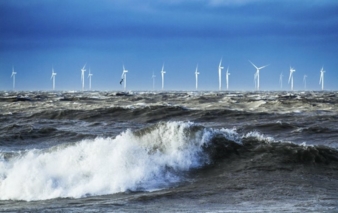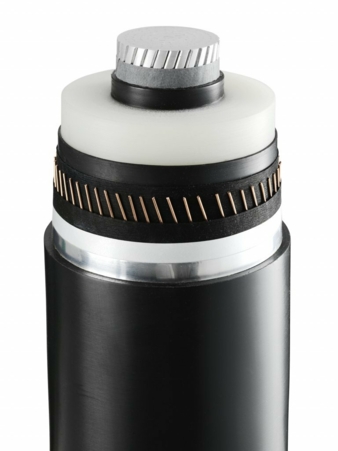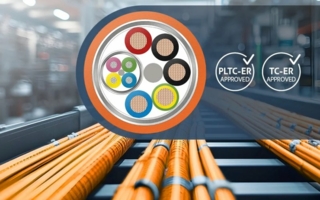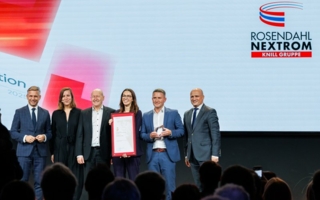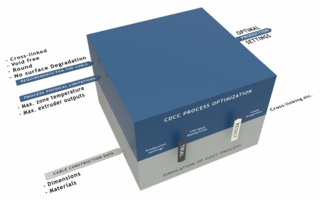10/09/2020 – Cable materials
Crucial component in the energy transition
Borealis announces an important milestone in its efforts to facilitate a more sustainable energy future. The high voltage direct current (HVDC) cable compound based on Borealis “Borlink” technology is being used in crosslinked polyethylene (XLPE) power cables qualified for the tender of the “German corridor projects”.
This enormous undertaking will transport renewable energy from wind farms off the north coast of Germany to southern areas of the country. Borealis “Borlink” is a crucial component in XLPE high-voltage power cables enabling HVDC technology transmitting electricity over longer distances with minimal losses. What is more, the material XLPE offers the additional sustainability benefit of being recyclable.
As a responsible supplier of value-adding polymers, Borealis has laid out key objectives in its overall sustainability strategy: to enhance sustainable development in all aspects of company operations as well as in the entire supply chain; and to identify business growth opportunities which promote greater sustainability. In practice, this means innovating and collaborating with partners in order to develop polyolefins-based solutions that enhance energy efficiency, reduce carbon emissions, and accelerate the uptake of renewable energy sources on the largest possible scale. XLPE made with Borealis Borlink extruded HVDC technology is one prime example of how these objectives have been successfully realised in practice.
Innovation for greater sustainability
“Borlink LS4258DCE”, an unfilled XLPE insulation compound, along with the accompanying HVDC semicon “Borlink LE0550DC”, was initially launched in 2014. This was a step-changing innovation because it enabled the use of extruded cable technology at significantly higher voltage and transmission levels than ever before. This cleared the path for XLPE extruded technology to allow a more efficient transmission of renewable energy from remote sources to the grid, contributing to a low carbon energy future.
Yet XLPE offers even more than superior, waste-minimising performance: it is also recyclable. By sorting, separating, and grinding XLPE cable waste, for example in the form of redundant cables, valuable and durable materials can be reclaimed. Among other applications, XLPE recyclate may be used as filler in various polyethylene (PE) and polypropylene (PP) compounds.
One Borealis partner, the leading power cable provider NKT, recently announced that it is one of the first cable manufacturer to use recycled XLPE in the production of cable drums. NKT was able to contribute thereby to the circularity of polyolefins in the power cable industry. It is further estimated that this process saves approximately up to around two tonnes kilos of CO2 for every tonne kilo of recycled XLPE. “Borealis is contributing to decarbonisation in multiple ways,” says Lucrèce Foufopoulos, Borealis Executive Vice President Polyolefins and Innovation & Technology. “The successful qualification of Borlink technology for the tender of an infrastructure project like the German Corridor projects shows that we have come full circle. Our polyolefin-based innovations have become crucial links to the energy transition. This is just one of many examples of Borealis’ contribution to a “greener future for all” through innovation and collaboration.
Commitment to a carbon-neutral future
In line with efforts to enhance sustainable development in all aspects of company operations, Borealis is reducing its CO2 footprint at its own facilities. By 2030, the company aims to have significantly reduced CO2 emissions from operations by using 50% of electricity from renewable sources; by increasing energy efficiency by 20% compared to a 2015 baseline; practicing zero continuous flaring; and capitalising on opportunities for carbon capture, utilisation, and storage. To this end, current projects in Europe include:
Upgrading cracker operations: in Stenungsund, Sweden, Borealis invests in upgrade and revamp of four cracker furnaces to the highest currently available standards in process safety and energy efficiency. This EUR 160 mio. Investment programme entails revamping four of the current six furnaces and shutting down completely the two remaining, ageing ones.
Using, not wasting, excess heat: in Stenungsund, excess low temperature heat produced at Borealis production facilities has been used since 2010 to power portions of the municipal district heating system. In 2018 alone, Borealis Stenungsund delivered 51 gigawatt hours (GWh) of heat to the city. This is equivalent to 5 million litres of fuel and reduces CO2 emissions by approximately 12,000 tons per year.
Open innovation for heat recovery: collaboration with award-winning start-up Qpinch has led to the establishment of the first ever full-scale commercial heat recovery unit. Located at the Borealis low-density polyethylene (LDPE) plant in Zwijndrecht/Antwerp, Belgium, the unit helps save around 2,200 tons of CO2 each year, comparable to the annual emissions of 1,500 small family cars.
Reducing non-emergency flaring: flaring is a necessary safety measure in which excess gases that cannot be recovered are safely burned. Yet because flaring results in noise and emissions, Borealis aims to keep flaring to a minimum. At the Antwerp low density plant, waste gases have been redirected to a recycling stream. This has lowered continuous emissions by 20% and corresponds to a reduction of around 2000 t/a of CO2.
Clean conversion of Navigator Aurora: since 2017, the state-of-the-art vessel Navigator Aurora has transported cost-efficient ethane from a US refinery to the Borealis cracker in Stenungsund. To make the vessel itself more environmentally friendly, its engine was converted to run on ethane. This was the first diesel engine conversion of its kind for a low-speed marine vessel.
Borealis solutions bring energy all around
For over 50 years, Borealis has provided value-creating polyolefin compounds for the global energy industry.
Because understanding project execution is critical to the success of ‘Power Projects’, Borealis provides unparalleled reliability with Assurance Delivered for submarine and land cable projects. In power transmission and distribution, Borealis satisfies the highest demands on performance and across a comprehensive portfolio for medium and low voltage cable applications, as well as high-performance polypropylene (PP) capacitor film solutions for the entire energy sector.
Extra-high, high voltage AC and DC, and medium voltage applications are powered by Borlink technology. While the “Visico” technology helps extend the lifetime of cable systems for low and medium voltage applications.
To meet safety standards for industries and buildings sustainably, Borealis also offers a low smoke and zero halogen flame retardant system. Borealis compounds also help meet network provider’s requirements for communication cables, namely fibre optic, data, copper multipair and coaxial cables.
Borouge at wire China 2020, booth W1F01
Borealis AG
IZD Tower, Wagramstrasse 17-19
1220 Vienna/Austria
Contact person is Virginia Mesicek
Tel.: +43 1 22400-772
virginia.mesicek@borealisgrpoui.com
www.borealisgroup.com
About Borealis and Borouge
Borealis is a leading provider of innovative solutions in the fields of polyolefins, base chemicals and fertilizers. With its head office in Vienna, Austria, the company currently has around 6,800 employees and operates in over 120 countries. Borealis generated Euro 8,3 billion in sales revenue and a net profit of Euro 906 million in 2018. Mubadala, through its holding company, owns 64% of the company, with the remaining 36% belonging to Austria-based OMV, an integrated, international oil and gas company. Borealis provides services and products to customers around the world in collaboration with Borouge, a joint venture with the Abu Dhabi National Oil Company (ADNOC). Borealis and Borouge aim to proactively benefit society by taking on real societal challenges and offering real solutions. Both companies are committed to the principles of “Responsible Care”, an initiative to improve safety performance within the chemical industry, and work to solve the world’s water and sanitation challenges through product innovation and their Water for the World programme.

